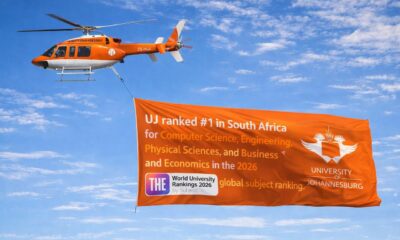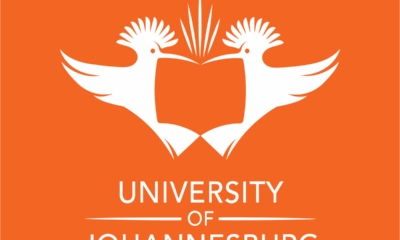Published
8 months agoon
By
zaghrah
South Africa’s universities are proving they can still punch above their weight globally, especially when it comes to international collaboration. In the 2026 QS World University Rankings, South African institutions achieved the highest average score in the world for International Research Network, a key measure of global partnerships in academia.
While overall rankings saw only three of the country’s 11 featured universities improve, this standout performance in cross-border research puts South Africa on top globally, beating research-driven nations like Denmark and Sweden.
At the heart of this achievement is the University of Johannesburg (UJ), which climbed 12 places to rank 14th worldwide in the International Research Network indicator, scoring 99.1 out of 100. The University of Cape Town (UCT), University of Pretoria, and University of the Witwatersrand (Wits) also secured top-50 global spots, showcasing South Africa’s strength in long-term research collaboration.
The indicator tracks how often universities co-author research with partners in other countries—focusing on partnerships that result in at least three publications over five years. This metric reflects more than just academic networking; it highlights deep, sustained, and mutually beneficial relationships between institutions.
South Africa’s average score of 91.1 was ahead of Denmark (90.1) and Sweden (88.8), marking the country as the most globally engaged research hub by this metric.
Despite this high note, only three South African universities improved their overall ranking:
University of Cape Town rose from 171st to 150th globally.
University of Johannesburg moved up to 308th.
University of KwaZulu-Natal climbed to 587th.
Six other institutions slipped in the rankings, with local universities facing intensifying global competition, particularly in areas like employability.
| SA Rank | 2026 Rank | Institution | 2025 Rank |
|---|---|---|---|
| 1 | 150 | University of Cape Town | 171 |
| 2 | 291 | University of the Witwatersrand | =267 |
| 3 | 302 | Stellenbosch University | 296 |
| 4 | 308 | University of Johannesburg | =312 |
| 5 | 362 | University of Pretoria | 354 |
| 6 | 558 | University of KwaZulu-Natal | =587 |
| 7 | 901-950 | University of South Africa | 851-900 |
| 8 | 951-1000 | North-West University | 851-900 |
| 9 | 951-1000 | University of the Western Cape | 951-1000 |
| 10 | 1001-1200 | Rhodes University | 951-1000 |
| University | Score | Global Rank | Change |
|---|---|---|---|
| University of Johannesburg | 99.1 | 14 | +12 |
| University of Cape Town | 97.7 | 24 | +12 |
| University of Pretoria | 97.6 | 26 | -2 |
| University of the Witwatersrand | 96.7 | 44 | +2 |
| University of KwaZulu-Natal | 95.9 | 62 | +45 |
| North-West University | 94.6 | 89 | +33 |
| University of the Free State | 93.7 | 107 | +23 |
| Stellenbosch University | 93.6 | 111 | -31 |
| University of South Africa | 92.5 | 138 | +18 |
However, the QS data also shows worrying trends in the Employer Reputation and Employment Outcomes indicators, which together make up 20% of the total score.
South African universities generally dropped in these areas, indicating a growing gap in graduate employability compared to international peers. Only the University of the Free State managed to maintain its position in this metric.
| Institution | Score | Rank | Change |
|---|---|---|---|
| University of the Witwatersrand | 99.5 | 21 | -3 |
| University of Cape Town | 97.7 | 49 | -3 |
| University of South Africa | 96.0 | 66 | -1 |
| Stellenbosch University | 88.9 | 114 | -13 |
| University of Pretoria | 84.8 | 138 | -16 |
| University of KwaZulu-Natal | 79.4 | 163 | -9 |
| University of Johannesburg | 69.6 | 215 | -25 |
Ben Sowter, QS Senior Vice President, praised South Africa’s global engagement but warned that it must not become complacent.
“With only three of the 11 institutions improving, universities need to keep pace with global improvements in higher education,” he said.
“Employability is a key area where institutions must work harder. Global peers are surging ahead.”
While South Africa’s universities continue to face headwinds like funding shortfalls, brain drain, and infrastructure challenges, their world-class performance in international collaboration signals that they remain a formidable force in global academia.
To retain their global standing, local institutions must pair research excellence with graduate employability, modern facilities, and enhanced student experiences. For now, though, they can proudly claim their place as leaders in global academic partnerships.
{Source: BusinessTech}
Follow Joburg ETC on Facebook, Twitter , TikTok and Instagram
For more News in Johannesburg, visit joburgetc.com


SIU Recovers R1.7 Billion In NSFAS Funds As 2026 Registrations Begin


UJ Tops National Charts: Ranked #1 in Four Key Subjects in Global 2026 THE Rankings


Too many passes, too few places: Why universities will turn away over half a million students in 2026


A Bridge of Brushstrokes: UJ Becomes African Home for Priceless Chinese Art Collection


Anglican Church Urges South African Institutions to Cut Ties with Israel


Durban University of Technology Clarifies Misinformation on DUT355 Project















